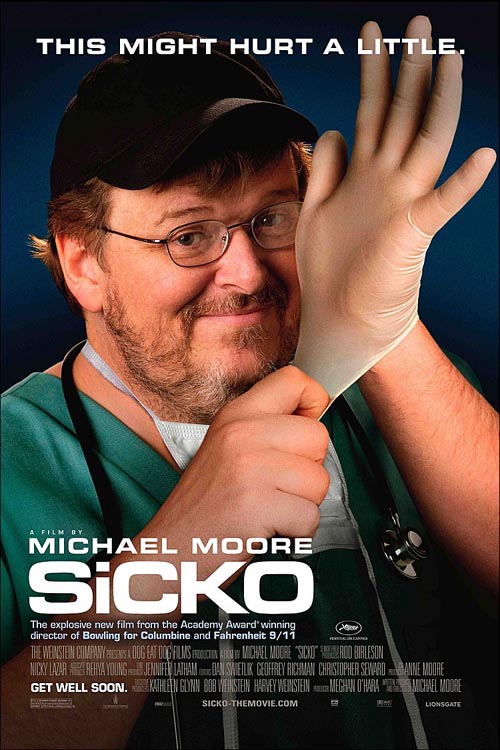Anthony's Film Review
Sicko (2007)

Michael Moore tackles a very important issue in his best documentary yet...
In his 2007 propagandistic documentary about the American health care system, Michael Moore does several things right. I'm not saying that he is totally unbiased in this film. By now, we all know that he has the habit of gathering only material that favor his arguments. Neither am I suggesting that Moore throws away his trademark style of film-making. What you see in this film is still very much like what you've seen before.
But I digress. The first thing that Moore does right with Sicko is focusing on an issue that truly involves everyone. Yes, there are social issues that affect many people, like corporate greed (as discussed in Roger & Me and The Big One) and guns (as explored in Bowling For Columbine), but health care is a basic human need. For years, I imagined that Moore would eventually do a film on health care in America. I'm not surprised that it's finally here.
There is a lot of territory to cover with this issue. Moore includes most of it into this film, so much that it almost feels like a complete overview of the scope of the problem. And what you see is emotional. You may cry when you hear about the ridiculous reasons for denying a test or procedure and their tragic consequences. You may cry even more when you hear insurance company insiders reveal what goes on behind closed doors. Most importantly, you may feel jealous when the health care systems in France, Canada, and England seem so much better than that of America.
One way or another, the film will move you. You are involved with health care somehow. For me, I'm one of the insiders. I have been employed by one of the HMOs mentioned in Sicko, even though my actual job description may not directly involve running the insurance machine. Still, I do recall an e-mail at work from an administrator mentioning ways to address public concern in light of this film's release.
Here are other things Moore does right. He doesn't move from one topic to another in an abrupt fashion. He eases you from one thing to the next. Sicko is a seamless journey across America and to other countries where you get to observe how everything about the health care issue is closely connected to each other. He stays behind the camera much more this time. After all, the movie is not about him. It's about the people. One scene mentions that, early on, Moore had put up an advertisement encouraging people to share managed care horror stories with him. His e-mail inbox received thousands of messages in a week. From that point on, he let the unfortunate tell their stories. It is these people who set the film in motion.
Moore seems to do things differently this time, especially compared to the heavily biased and angry Fahrenheit 9/11. However, it is still a populist documentary with the Michael Moore trademarks. It has humor to maintain good spirits, though it is much less here. It looks at the grander picture and not focus on the issue itself. He questions human nature and explores how cultural beliefs in a country could mean the difference between a comfortable life and a miserable one. And as with his other films, he does something involving going to great lengths to help others.
In Sicko, Moore gathers volunteer 9/11 workers who developed lung disease from cleaning up at Ground Zero. He takes them to Cuba for medical attention, all because al Qaeda detainees at Guantanamo Bay seem to get better health care than the average American citizen. The entire sequence takes several minutes. It allows you to absorb how these people really feel. This is the best scene in the film and perhaps the most humane thing Moore has done for others in a film to date.
I definitely consider Sicko my favorite Michael Moore documentary so far. I knew this even about 30 minutes into it. He is biased like always, but he is a master of presentation. He engages you and opens your eyes to learn more about something we've already heard of. Michael Moore has a large enough following that it is not uncommon for someone in the theater audience to pass out flyers for an upcoming event related to the film. I have seen this happen twice so far, once with Fahrenheit 9/11 and once with Sicko. If Moore wants people to get together and help solve the issues that matter, then he may be slowly getting his wish.
I think the message is best summed up by a line in the film by former British Parliament member Tony Benn: "If you can find the money to kill people, then you can find the money to help people." That quote along with the start of the closing credits generated much applause, mine included.
Anthony's Rating:










For more information about Sicko, visit the Internet Movie Database.
Home
Film Reviews
Other Reviews
Commentaries
Links
About AFR
RSS Feed
Privacy Policy
E-mail Anthony











